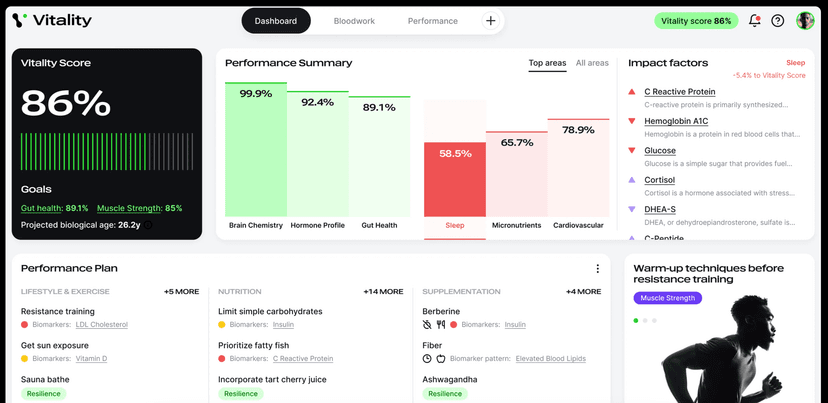The hs-CRP blood test is a powerful tool for assessing inflammation in the body. This test is particularly important for understanding heart health, as elevated hs-CRP levels can indicate a higher risk of cardiovascular diseases. By measuring the levels of high-sensitivity C-reactive protein in the blood, healthcare providers can gain valuable insights into a patient's overall health and potential risks for conditions like heart attacks and strokes. This article will explore the significance of the hs-CRP test, how to interpret the results, and ways to manage inflammation through lifestyle changes.
Key Takeaways
- The hs-CRP test measures inflammation levels in the body and helps assess heart disease risk.
- Elevated hs-CRP levels can indicate a higher chance of heart attacks, strokes, and other cardiovascular issues.
- Various factors, including diet, exercise, and smoking, can influence hs-CRP levels.
- Understanding your hs-CRP levels can guide you in making healthier lifestyle choices to reduce inflammation.
- Consulting a healthcare provider is crucial if you have high hs-CRP levels or symptoms of inflammation.
What Is the hs-CRP Blood Test?
Definition and Purpose
The high-sensitivity C-reactive protein (hs-CRP) blood test measures the level of C-reactive protein in your blood. This protein is produced by the liver and increases when there's inflammation in the body. The hs-CRP test is more sensitive than the standard CRP test, allowing it to detect lower levels of inflammation.
How It Differs from Standard CRP Tests
While both tests measure C-reactive protein, the hs-CRP test is more precise. It can detect smaller changes in CRP levels, making it useful for identifying low-grade inflammation that might not be picked up by the standard CRP test. This sensitivity is particularly important for assessing the risk of cardiovascular diseases.
Common Reasons for Testing
Doctors often order an hs-CRP test to:
- Assess the risk of heart disease
- Monitor inflammation levels in chronic conditions like rheumatoid arthritis or lupus
- Evaluate the effectiveness of treatments aimed at reducing inflammation
The hs-CRP test is a valuable tool for catching early signs of inflammation, which can be crucial for preventing more serious health issues down the line.
The Role of hs-CRP in Detecting Inflammation
How Inflammation Affects the Body
Inflammation is the body's natural response to injury or infection. When you get a cut or catch a cold, your immune system sends out cells to fight off the invaders. This can cause redness, swelling, and pain. Chronic inflammation, however, can lead to long-term health problems like heart disease, diabetes, and arthritis.
Types of Inflammation Detected by hs-CRP
The hs-CRP test is particularly good at spotting low levels of inflammation that might not cause obvious symptoms. It can detect both acute inflammation, like from an infection, and chronic inflammation, which can be due to ongoing conditions like obesity or autoimmune diseases.
Other Inflammation Markers
While hs-CRP is a key marker, it's not the only one. Other tests that can help detect inflammation include:
- Erythrocyte Sedimentation Rate (ESR): Measures how quickly red blood cells settle at the bottom of a test tube. Faster rates can indicate inflammation.
- Interleukin-6 (IL-6): A protein that plays a role in inflammation and can be measured to assess inflammatory conditions.
- Ferritin: High levels of this iron-storing protein can also indicate inflammation.
- Complete Blood Count (CBC): This test measures various components of your blood and can indicate inflammation through elevated white blood cell counts.
Understanding these markers can help guide treatment plans to reduce inflammation and improve overall health.
Understanding Your hs-CRP Test Results
Interpreting hs-CRP Levels
The hs-CRP test measures the level of C-reactive protein in your blood, which can indicate inflammation. Higher levels of hs-CRP suggest more inflammation in the body. This can be a sign of various conditions, including infections and chronic diseases.
Standard Ranges and What They Mean
Here's a quick look at what different hs-CRP levels might indicate:
| hs-CRP Level (mg/L) | Risk Level |
|---|---|
| Less than 1.0 | Low risk |
| 1.0 to 3.0 | Average risk |
| Greater than 3.0 | High risk |
- Less than 1.0 mg/L: Indicates low risk of heart disease.
- 1.0 to 3.0 mg/L: Suggests average risk of heart disease.
- Greater than 3.0 mg/L: Points to a high risk of heart disease and other inflammatory conditions.
Factors That Can Affect Results
Several factors can influence your hs-CRP levels, including:
- Infections: Recent infections can temporarily raise hs-CRP levels.
- Chronic Diseases: Conditions like diabetes and rheumatoid arthritis can cause elevated levels.
- Lifestyle Factors: Smoking, lack of exercise, and poor diet can also increase hs-CRP levels.
- Medications: Some drugs can affect your hs-CRP levels, either raising or lowering them.
It's important to discuss your hs-CRP test results with your healthcare provider to understand what they mean for your health. They can help you interpret the results in the context of your overall health and medical history.
hs-CRP and Heart Health
Link Between hs-CRP and Cardiovascular Disease
High-sensitivity C-reactive protein (hs-CRP) is a marker of inflammation in the body. Elevated hs-CRP levels are often linked to a higher risk of cardiovascular diseases, such as heart attacks and strokes. This is because inflammation plays a key role in the development of atherosclerosis, which is the buildup of plaques in the arteries.
Predicting Heart Attacks and Strokes
Doctors use hs-CRP levels to help predict the risk of heart attacks and strokes. Generally, an hs-CRP level above 2.0 milligrams per liter (mg/L) indicates a higher risk of heart disease. It's important to note that other factors, like infections or injuries, can also raise hs-CRP levels temporarily.
Managing Heart Health Through hs-CRP Levels
Managing your hs-CRP levels can be a part of maintaining good heart health. Here are some steps you can take:
- Healthy Diet: Eating a balanced diet rich in fruits, vegetables, and whole grains can help lower inflammation.
- Regular Exercise: Physical activity can reduce inflammation and improve heart health.
- Avoid Smoking: Smoking increases inflammation and hs-CRP levels.
- Limit Alcohol: Drinking alcohol in moderation can help keep inflammation in check.
Keeping track of your hs-CRP levels can provide valuable insights into your heart health and help you take proactive steps to reduce your risk of cardiovascular diseases.
Lifestyle Factors Influencing hs-CRP Levels
Diet and Nutrition
What you eat can have a big impact on your hs-CRP levels. Foods high in sugar and unhealthy fats can increase inflammation. On the other hand, a diet rich in fruits, vegetables, whole grains, and lean proteins can help lower inflammation. Omega-3 fatty acids, found in fish and flaxseeds, are particularly good at reducing hs-CRP levels.
Exercise and Physical Activity
Regular exercise is another way to keep your hs-CRP levels in check. Physical activity helps reduce inflammation and improve heart health. Aim for at least 30 minutes of moderate exercise, like walking or cycling, most days of the week.
Impact of Smoking and Alcohol
Smoking and excessive alcohol consumption can raise your hs-CRP levels. Quitting smoking and limiting alcohol intake can help lower inflammation. If you smoke, seek help to quit. If you drink, do so in moderation—up to one drink per day for women and up to two drinks per day for men.
Making small changes in your lifestyle can have a big impact on your hs-CRP levels and overall health. Start with one change at a time and build from there.
Reducing Inflammation: Tips and Strategies
Dietary Changes
Making smart food choices can significantly reduce inflammation. Incorporate more fruits, vegetables, and whole grains into your diet. Foods rich in omega-3 fatty acids, like salmon and flaxseeds, are also beneficial. Avoid processed foods, sugary drinks, and excessive red meat.
Medications and Supplements
Certain medications and supplements can help manage inflammation. Nonsteroidal anti-inflammatory drugs (NSAIDs) like ibuprofen can be effective. Supplements such as fish oil, turmeric, and vitamin D have anti-inflammatory properties. Always consult your healthcare provider before starting any new medication or supplement.
Lifestyle Modifications
Adopting a healthier lifestyle can make a big difference. Regular exercise, adequate sleep, and stress management techniques like meditation can lower inflammation levels. Quitting smoking and reducing alcohol intake are also crucial steps.
Small changes in your daily routine can lead to significant improvements in reducing inflammation and enhancing overall health.
When to Consult a Healthcare Provider
Symptoms Indicating High Inflammation
If you experience persistent symptoms like unexplained fatigue, fever, or pain, it might be time to see a healthcare provider. These symptoms can indicate high levels of inflammation in your body. Other signs include swelling, redness, and loss of function in affected areas.
Frequency of Testing
How often you should get tested depends on your health status and risk factors. Generally, people with chronic conditions or a family history of heart disease should have their hs-CRP levels checked more frequently. Your doctor can provide personalized advice based on your specific needs.
Next Steps After High hs-CRP Levels
If your hs-CRP levels are high, your healthcare provider will likely recommend further tests to identify the underlying cause. This may include additional blood tests, imaging studies, or referrals to specialists. It's crucial to follow your doctor's recommendations to manage your health effectively.
Regular check-ups and timely consultations with your healthcare provider can help you stay on top of your health and catch potential issues early.
Conclusion
The hs-CRP blood test is a valuable tool for detecting inflammation in the body, which can be a sign of various health issues, including heart disease. By measuring the levels of C-reactive protein in your blood, this test helps doctors understand your risk for conditions like heart attacks and strokes. It's important to remember that while elevated hs-CRP levels can indicate inflammation, they are not specific to one disease and can be influenced by other factors like infections or injuries. Regular monitoring and a healthy lifestyle can help manage inflammation and improve overall heart health.
Frequently Asked Questions
What is the hs-CRP blood test?
The hs-CRP blood test measures the level of high-sensitivity C-reactive protein in your blood. This protein increases when there's inflammation in your body.
Why is the hs-CRP test important for heart health?
High levels of hs-CRP can indicate a higher risk of heart disease, heart attacks, and strokes. It helps doctors predict and manage these conditions.
How do I prepare for an hs-CRP test?
Generally, no special preparation is needed. However, you should inform your doctor about any medications or supplements you are taking.
What do high hs-CRP levels mean?
High hs-CRP levels suggest that there is inflammation in your body, which could be due to various conditions like infections, chronic diseases, or heart problems.
Can lifestyle changes affect hs-CRP levels?
Yes, lifestyle changes like eating a healthy diet, exercising regularly, and avoiding smoking and excessive alcohol can help lower hs-CRP levels.
When should I consult a healthcare provider about hs-CRP levels?
You should talk to your healthcare provider if you have high hs-CRP levels, especially if you have symptoms of inflammation or are at risk for heart disease.
























